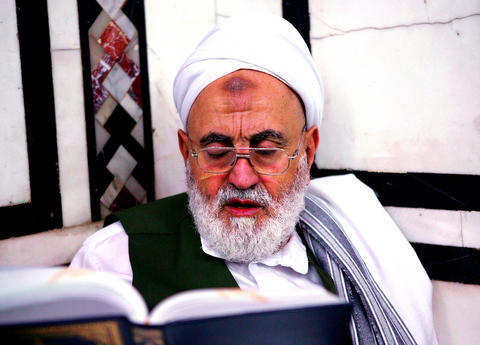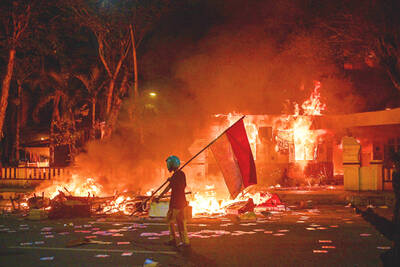As Egyptians increasingly emphasize Islam as the cornerstone of identity, there has been a growing emphasis on displays of piety.
For women, that has rapidly translated into the nearly universal adoption of the hijab, a scarf fitted over the hair and ears and wrapped around the neck. For men, it is more and more popular to have a zebibah.
The zebibah, Arabic for raisin, is a dark circle of callused skin, or in some cases a protruding bump, between the hairline and the eyebrows. It emerges on the spot where worshippers press their foreheads to the ground during their daily prayers.

PHOTO: NY TIMES NEWS SERVICE
It may sometimes look like a painful wound, but in Egypt it is worn proudly.
Two decades ago, Egypt was a Muslim country with a relatively secular style. Nationalism and Arabism had been the foundation of identity. But today, Egypt, like much of the Arab Middle East, is experiencing the rise of Islam as the ideology of the day.
With that, religious symbols have become the fashion.
"The zebibah is a way to show how important religion is for us," said Muhammad al-Bikali, a hairstylist in Cairo, in an interview last month.
Bikali had a well-trimmed mustache and an ever-so-subtle brown spot just beneath his hairline.
"It shows how religious we are. It is a mark from God," he said.
Observant Muslims pray five times a day. Each prayer involves kneeling and touching one's forehead and nose to the ground. All five prayers require placing one's head on the ground for a total of 34 times, though many people add prayers and with that, more chances to press their heads to the ground.
Some people say the bump is the inevitable result of so many prayers -- and that is often the point: The person with the mark is broadcasting his observance, his adherence to one of the five pillars of Islam.
"If we just take it for what it is, then it means that people are praying a lot," said Gamal al-Ghitani, editor in chief of the newspaper Akhbar El Yom. "But there is a kind of statement in it. Sometimes as a personal statement to announce that he is a conservative Muslim and sometimes as a way of outbidding others by showing them that he is more religious or to say that they should be like him."
There are many reasons for the Islamic revival that has swept Egypt and the Middle East, from the rise of satellite TV, which offers 24 hours of religious programming a day, to economies that offer little hope of improving people's lives, to the resentment of Western meddling in the Middle East.
But there is also peer pressure, a powerful force in a society where conformity and tradition are aspired to and rewarded.
"I will learn more about someone when I get to know him, but the appearance is the first impression," said Khaled Ashry, 37, a security guard at a private school.
Hanaa el-Guindy, 21, an art student in Cairo, covers her head and wears a long, loose-fitting dress to hide her figure.
"The outward appearance is important," Guindy said. "It says, `I am a good person.' This is a good thing. On judgment day, this sign, the zebibah on their forehead, will shine. It will say, `God is great.' "
In much of the Arab world, symbols of extreme observance are fairly standard and tend to stem from the conservative religious cultures of Persian Gulf nations, like Saudi Arabia.
Those symbols have seeped into Egypt and are growing in popularity. More women, for example, are covering their faces with a niqab, a black mask of cloth that has come to Egypt from the Persian Gulf.
The zebibah, however, is 100 percent Egyptian and does not carry the negative connotation of imported symbols.

Australia has announced an agreement with the tiny Pacific nation Nauru enabling it to send hundreds of immigrants to the barren island. The deal affects more than 220 immigrants in Australia, including some convicted of serious crimes. Australian Minister of Home Affairs Tony Burke signed the memorandum of understanding on a visit to Nauru, the government said in a statement on Friday. “It contains undertakings for the proper treatment and long-term residence of people who have no legal right to stay in Australia, to be received in Nauru,” it said. “Australia will provide funding to underpin this arrangement and support Nauru’s long-term economic

ANGER: Unrest worsened after a taxi driver was killed by a police vehicle on Thursday, as protesters set alight government buildings across the nation Protests worsened overnight across major cities of Indonesia, far beyond the capital, Jakarta, as demonstrators defied Indonesian President Prabowo Subianto’s call for calm. The most serious unrest was seen in the eastern city of Makassar, while protests also unfolded in Bandung, Surabaya, Solo and Yogyakarta. By yesterday morning, crowds had dispersed in Jakarta. Troops patrolled the streets with tactical vehicles and helped civilians clear trash, although smoke was still rising in various protest sites. Three people died and five were injured in Makassar when protesters set fire to the regional parliament building during a plenary session on Friday evening, according to

‘NEO-NAZIS’: A minister described the rally as ‘spreading hate’ and ‘dividing our communities,’ adding that it had been organized and promoted by far-right groups Thousands of Australians joined anti-immigration rallies across the country yesterday that the center-left government condemned, saying they sought to spread hate and were linked to neo-Nazis. “March for Australia” rallies against immigration were held in Sydney, and other state capitals and regional centers, according to the group’s Web site. “Mass migration has torn at the bonds that held our communities together,” the Web site said. The group posted on X on Saturday that the rallies aimed to do “what the mainstream politicians never have the courage to do: demand an end to mass immigration.” The group also said it was concerned about culture,

CRACKDOWN: The Indonesian president vowed to clamp down on ‘treason and terrorism,’ while acceding to some protest demands to revoke lawmaker benefits Protests in Indonesia over rising living costs and inequality intensified overnight, prompting Indonesian President Prabowo Subianto to cancel a planned trip to China, while demonstrators reportedly targeted the homes of the finance minister and several lawmakers. Rioters entered Indonesian Minister of Finance Sri Mulyani Indrawati’s residence near Jakarta early yesterday, but were repelled by armed forces personnel, Kompas reported. Items were taken from the homes of lawmaker Ahmad Sahroni and two others, according to Detik.com. The reports of looting could not be independently verified, and the finance ministry has not responded to requests for comment. The protests were sparked by outrage over